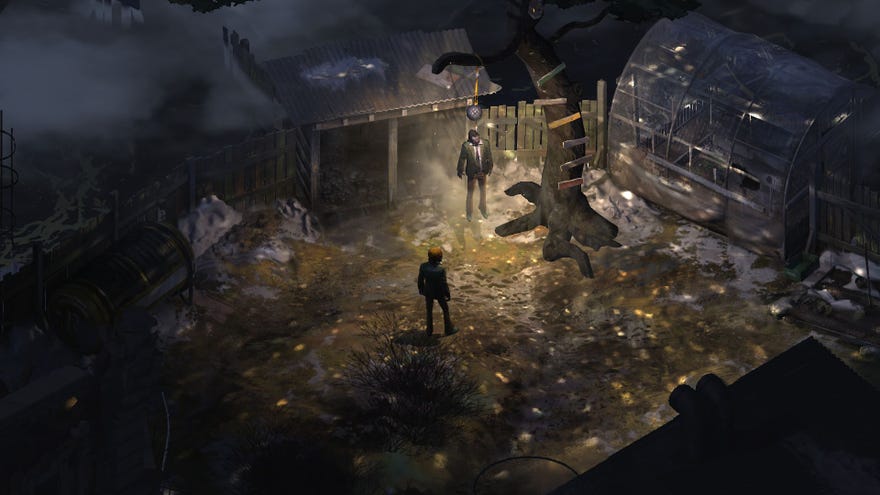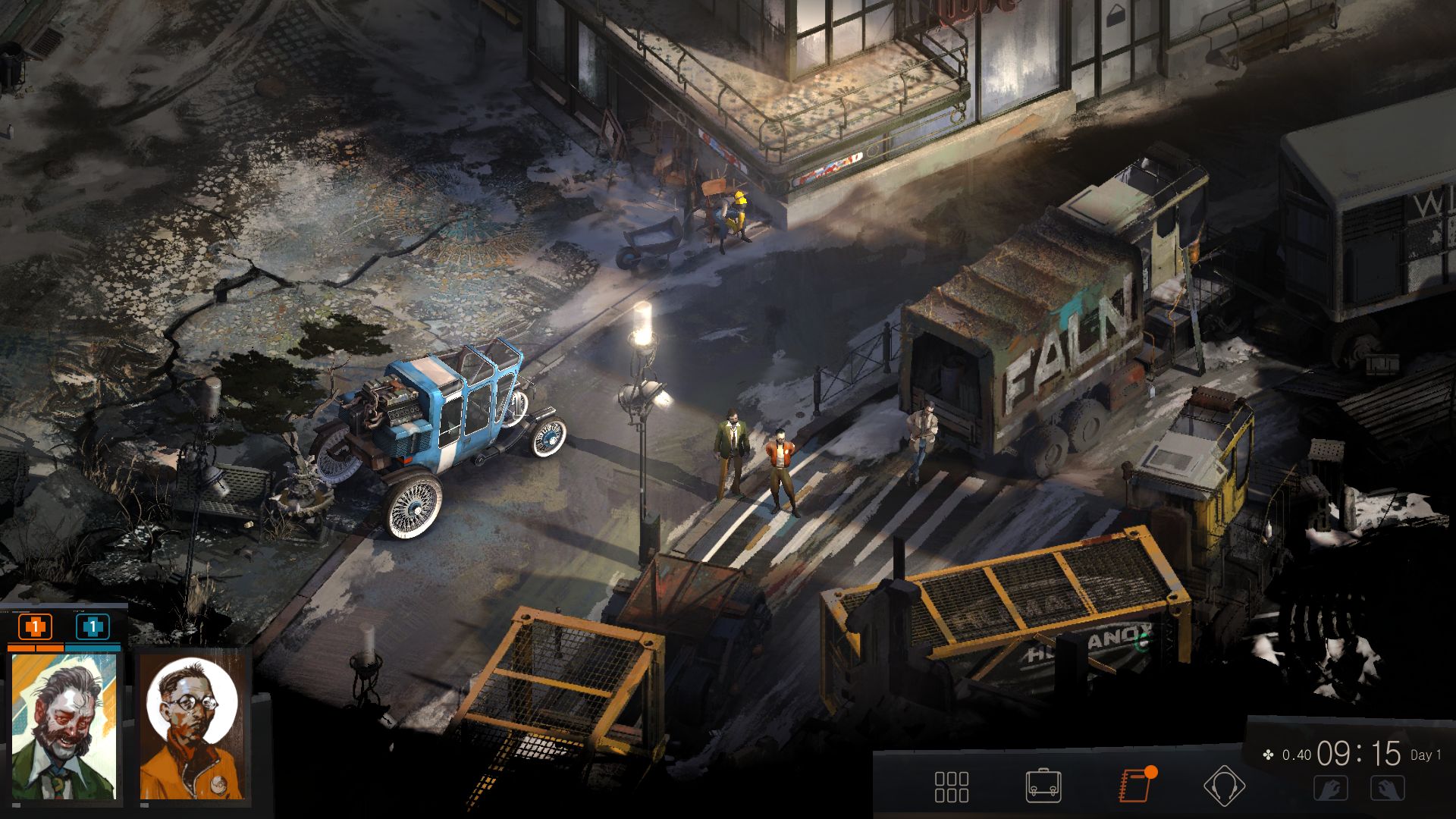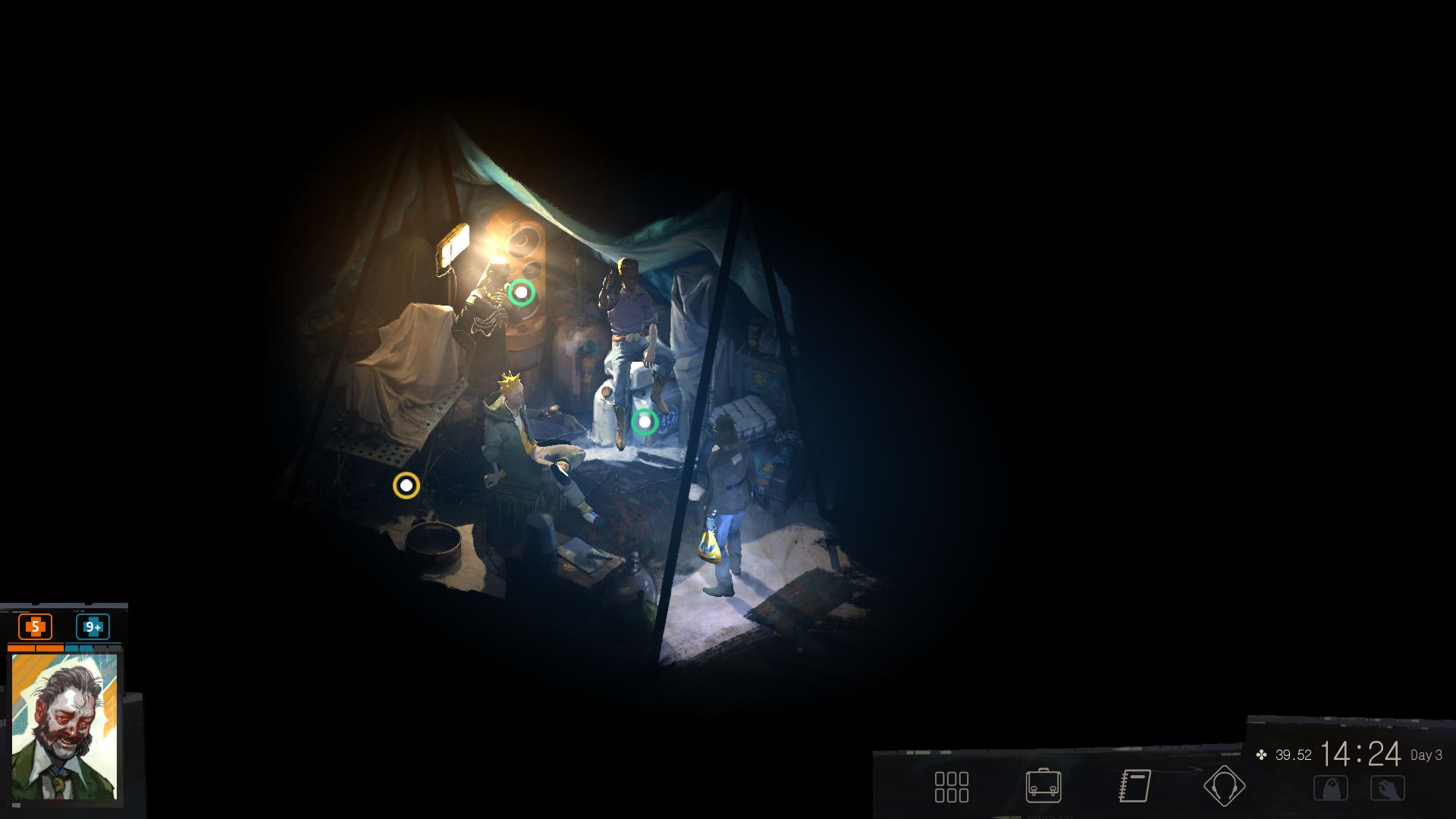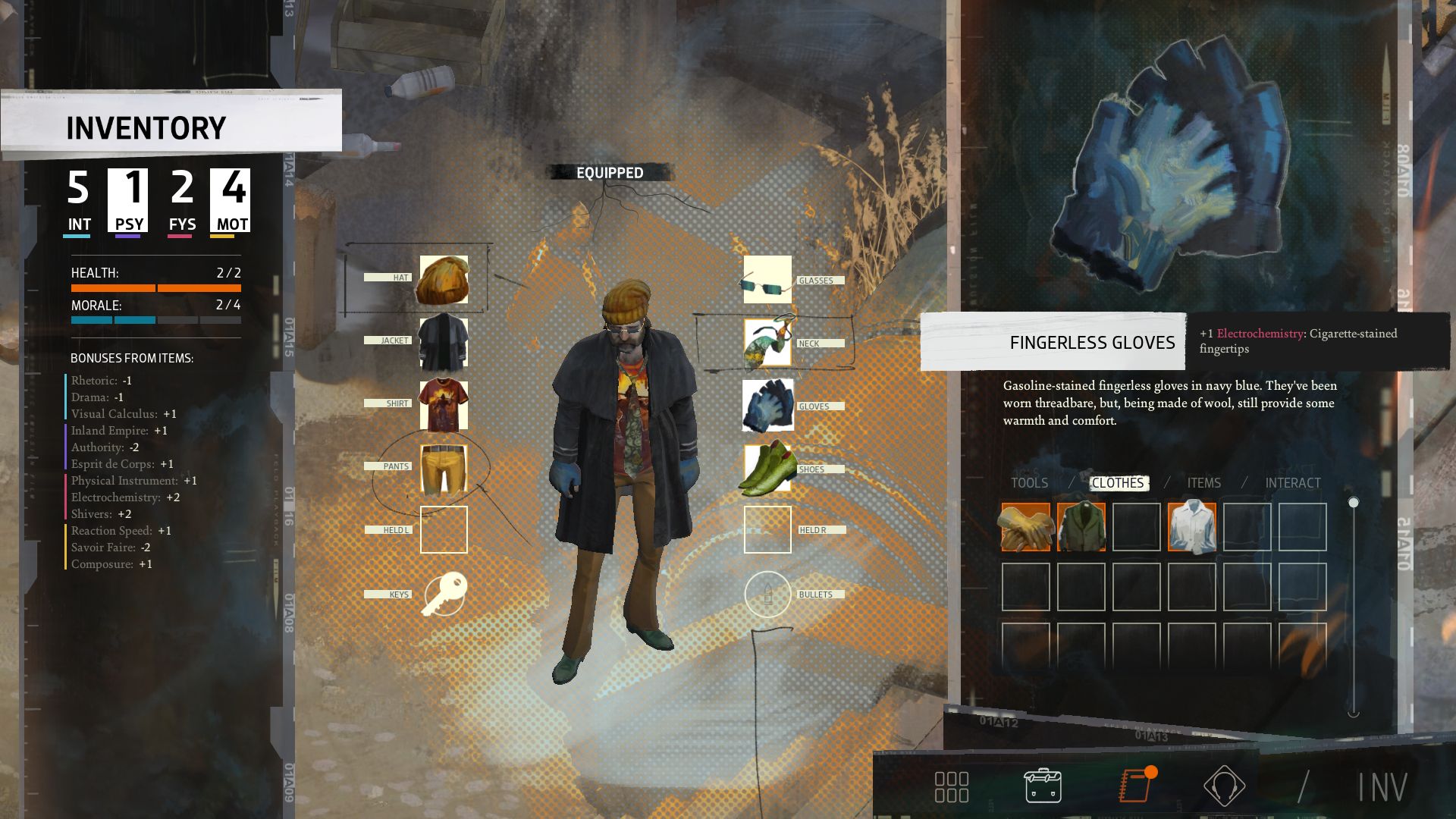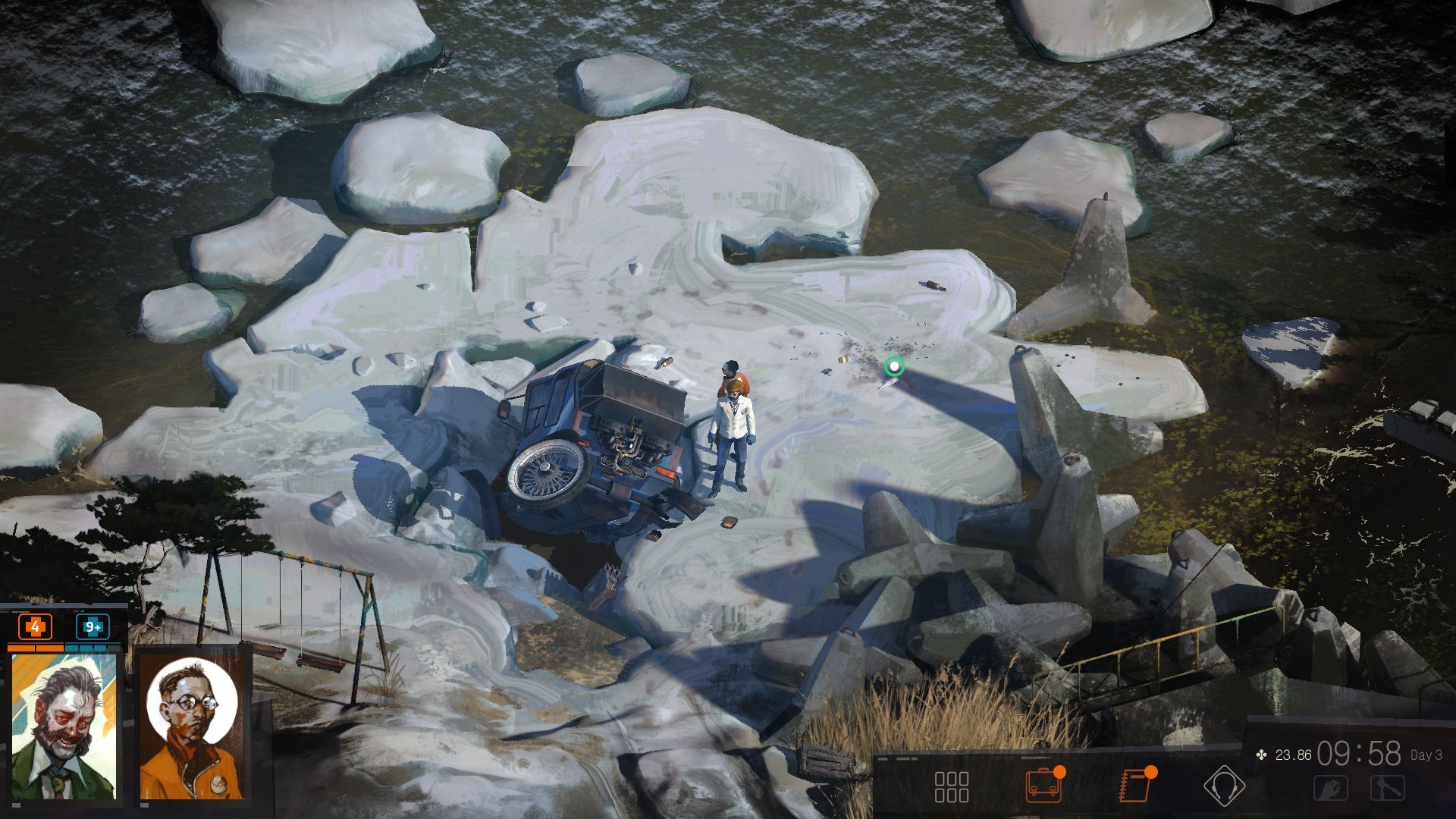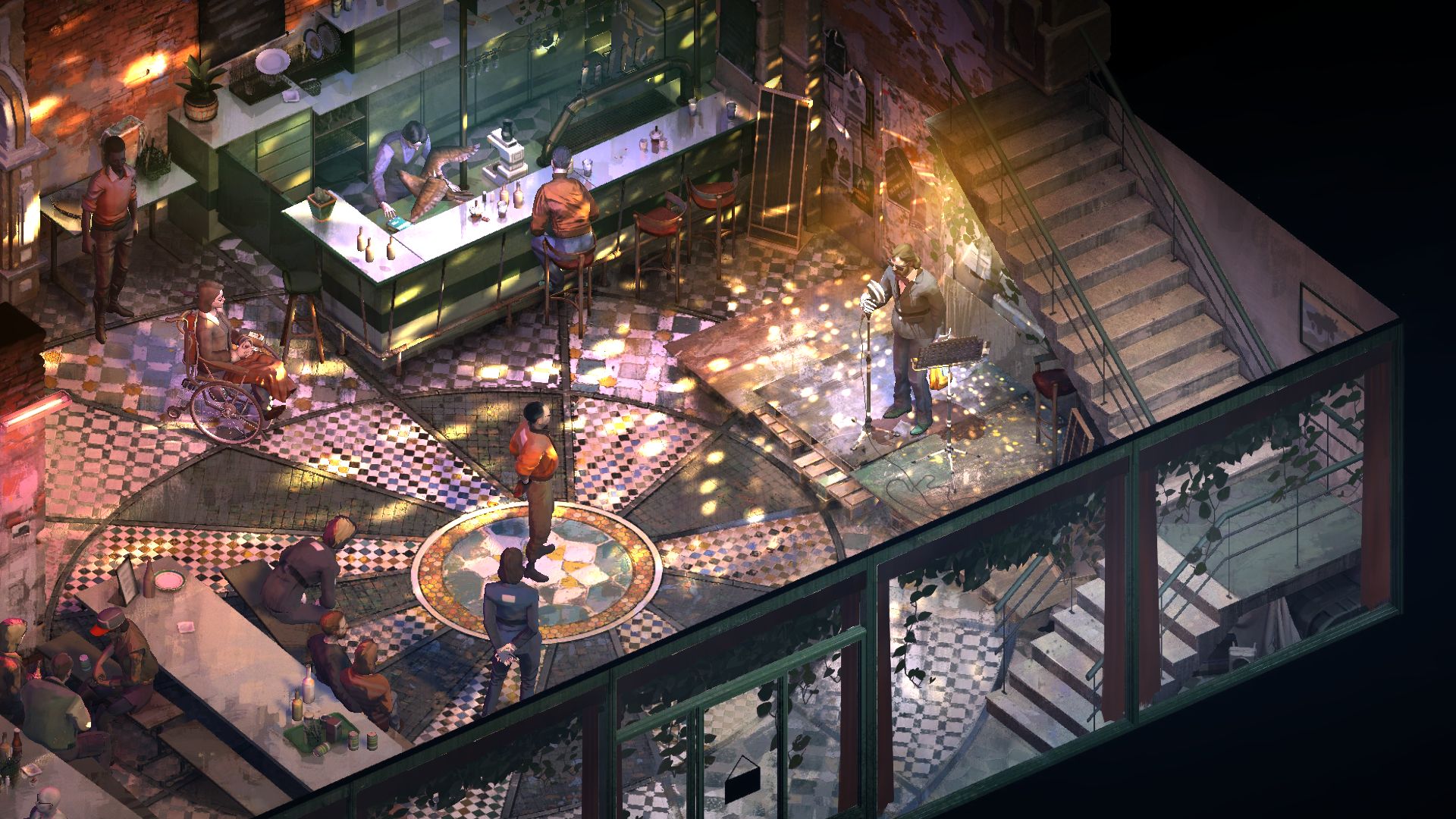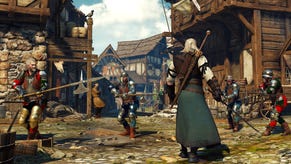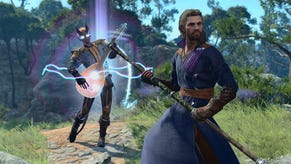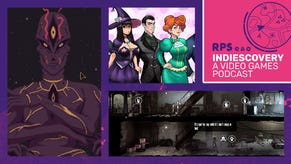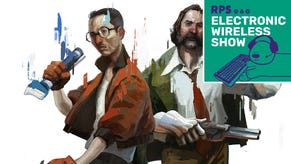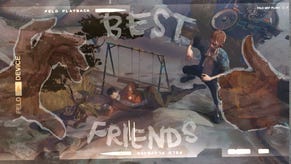Disco Elysium offers a dark mirror to my mid-life crisis
It isn't too late.
In the yard below, a corpse hangs from a pine tree.
It is my failure and my shame for all to see, rotting in plain sight.
Martainaise, the broken-down home of Disco Elysium’s broken-down police story, is an excoriating light shone not just upon its broken-down policeman, but also upon me, and my failure to be the person I thought I was. It is my mid-life crisis writ in grey rainfall, my dread realisation that death is coming and I’m not who I ever meant to be.
In the yard below, a corpse hangs from a pine tree. Decaying in the rain. It’s been there for days. Everyone sees it, no-one mentions it.
It’s my job to get the dead man down from the tree, cut the noose from his neck, grant him some dignity, and restore a sense of hope to this neighbourhood that is entirely impossible when every day begins with the sight of a corpse.
I cannot get the dead man down. I lack the strength, and I lack the wit. So he yet rots, right there in front of everyone.
I look in the mirror and I see the wreckage of a person staring back at me. An old man who once thought he was everything, but now all hair and age and grime and yesterday’s booze.
I am not him, but I am him. I don’t have an alcohol problem, but I can feel, deep in my stomach, the knot of regrets and worries and disappointments that in some people might lead to an alcohol problem. Might make them want to escape the oncoming train, any way they can.
I was supposed to be more than this. Is it too late?
So I shuffle around Martinaise, putting the pieces of who I thought I was back together, and more importantly putting together the pieces of who I’m going to be instead – and maybe for the rest of my days – now that I know I am not that person.
Once I sought drama and conflict, now I crave calm and ease. In almost every conversation with Martinaise’s variously penitent denizens, I’m given a chance to stand up for something. Smash the state! For the workers!
They feel too strong. As with so many my age – centrist dad, centrist dad, centrist dad - I drift towards grey nothingism instinctively, seeking to placate everyone, my words a wash of apologies and sympathy or finger-wagging at distant tyrants. I’m sorry, I’m sorry, I’m sorry.
It feels like doing something. It isn’t.
In the yard below, a corpse hangs from a pine tree. I can’t stand the stench. So I venture a few bolder things. About violent protest. About communism. About workers. It scares me. I don’t know where it leads to. I don’t know what I really believe, but I want to believe in something. Maybe it will make the bough bend a little.
Nearby, a boy with demonically red hair and a voice like nailguns fired into a human backbone pelts the corpse with stones. Cuno. What is he, 10, 12? 8?
No-one in any imagined world I’ve visited in recent years has scared me, a man of 40, more than Cuno.
He’s just a boy, but that lends him a total absence of shame, or fear, or regret. Cuno still believes he can be everything. This translates into someone surely, surely less intelligent than I, always having a comeback unbelievable both in its immediacy and its devastation. Cuno contains none of the anxieties interwoven into social communication that interrupt our instinctive comments, just pure and instantaneous and unvarnished wit.
“FUCK DOES CUNO CARE?” is his barked and shrieked opening gambit in any conversational attempt, a masterclass in violent nihilsm. Excepting the unravelling and dark backstory which I could uncover should I persist in appalling conversation with him, Cuno truly does not care.
That is why Cuno is so frightening. Cuno can say exactly what he is thinking, which is pure and unbridled contempt for anyone similarly uncensored. Nobody’s with him, everyone’s against him, there are no consequences, and Cuno doesn’t fucking care.
I’ve met a lot of Cunos in my time, albeit slightly older ones. I recognise them on sight. It’s in the eyes.
Honked at by car horns while on my bike, purely to startle me, purely to watch me wobble and laugh at the idea I might die. Shouldered roughly past in the street while carrying my baby. Simply unseen as I walked by, bearded and haggard in a non-descript coat. “The fuck are you looking at?” as I walk down the wrong street, looking at nothing.
Cunos, children, or at least not-yet-adults, with cold and pitiless eyes, staring without shame or interest, no concern about consequence. I am old and weak, not sufficient as prey but perhaps something to be briefly toyed with. Cuno doesn’t fucking care.
I shouldn’t fucking care either, but I’m desperate to seem somehow magnificent in Cuno’s hateful eyes. For every insight, every breakthrough in the case, I return to him, hoping to earn his meaningless respect, hoping for something other than unchecked contempt. Hoping to not look like a pathetic old man who failed to be the person he thought he would be. Cuno doesn’t fucking care.
Why this? Why couldn’t I instead buy a fast car I can’t afford, which I would then use exclusively to drive to Tesco’s at 20 miles an hour? Why do I have to flay my own soul by looking in horror at my reflection in a videogame about an alcoholic deadbeat cop, instead of simply deciding to live a little more?
Time marches on. I still haven’t removed the corpse. The days pass. There’s never enough time, because I use it all up doing the same things in the same places. Talk to Cuno, who doesn’t fucking care. Look at my reflection, which is dying. Spout a few things about unions and workers and socialism, as if it’s the same thing as actually doing anything.
The most I’ve pushed myself so far is to get my coat down. Some days, putting my coat on is the hardest thing in the world. God, it really is.
Do I collapse into shrugging oblivion, or do I fight that?
In 1999, just a few weeks short of 20 years before I would play Disco Elysium, I played a videogame called Planescape: Torment. It was the literate tale of an amnesiac man solving a mystery in a broken world, piecing together his regret-strewn past, confronting the wreckage he had left in his wake, and deciding who he would henceforth be. At 20 years old, freshly-released from the hormonal hellstorm of teenagerdom, it was a song of hope. I needed to decide who I was going to be: the Nameless One proved that redemption, and connection, and beauty, and nobility were all within my grasp. I could be anyone I wanted to be.
I was. I built myself in the years that followed. I believed in things. I cared about things. I fought for things. I was going to be great.
Now I sit at my keyboard, half-paralysed by tiredness, by worry, by a thousand tiny burdens, tweeting things about politics, doing nothing about politics, living a life of school runs and cleaning on loop, chasing pay cheques, sitting in front of the TV, talking about how tired I am. A drink or two at the end of the day. I’ve earned it, right?
I’m always apologising.
In the yard below, a corpse hangs from a pine tree, and a policeman can’t remember how to be a policeman. He’s lucky if others respond to him with pity.
There could be no more apposite a book-end to Planescape: Torment than Disco Elysium, the literate tale of an amnesiac man solving a mystery in a broken world, piecing together his regret-strewn past, confronting the wreckage he had left in his wake, and deciding who he would henceforth be. It has not been a song of hope for me, but I think it might yet become one. It is forcing me to confront the wreckage I’ve left in my wake, not of others but of myself.
What can change the nature of a man at 40? Do I accept this fate, of mealy-mouthed political nothingness, of grey routines, of death now casting me its first sideways glances? Or do I find a way to get that mouldering corpse down from that bone-fingered tree before the decay completes?
I haven’t played a more important videogame than Disco Elysium in a very long time. Perhaps not since 1999.
It is not a game about youth and heroism, conquest and vengeance, triumph or power. It is a game about confronting one’s own wreckage. It is a game not about regrets, but about how shameful those regrets are, how destructive they are. It is a game about challenging regrets, and building something new from the wreckage. It is a mirror I cannot turn away from.
In the yard below, a corpse hangs from a pine tree.
In 1999, a boy finds himself by reading about a pretend man’s scars.
In 2019, a middle-aged man worries that he’ll drown in his own scars.
In Martainaise, an old boozehound who left unspeakable wreckage in his wake slowly, painfully re-assembles himself into a person of competence, of empathy, of intent and of purpose. His early, self-mocking words glorifying self-destruction and dismissing accomplishment give way to new clarity, new earnestness, new capability. Too many apologies, yes, but with the intent of doing better now.
In the yard below, a corpse is finally removed from a pine tree. Dignity at last. The old man’s partner addresses him as “Detective.”
It isn’t too late. It isn’t too late.
Disco Elysium is my mid-life crisis. Disco Elysium is my game of the year.
